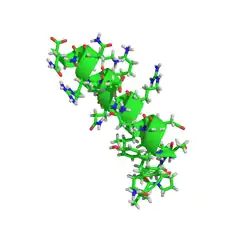Motilin
Motilin ist ein gastrointestinales Peptidhormon, das in den M-Zellen des Dünndarms (deren Zahl abnehmend von Duodenum zu Ileum) gebildet wird und gemeinsam mit Ghrelin ausgeschüttet wird. Das Peptid besteht aus 22 Aminosäuren.[1][2]
| Motilin | ||
|---|---|---|

| ||
| Bänder/Stäbchenmodell nach PDB 1LBJ | ||
| Eigenschaften des menschlichen Proteins | ||
| Masse/Länge Primärstruktur | 22 Aminosäuren | |
| Präkursor | Promotilin (115 AS) | |
| Bezeichner | ||
| Gen-Name | MLN | |
| Externe IDs | ||
| Vorkommen | ||
| Homologie-Familie | Motilin precursor | |
| Übergeordnetes Taxon | Eutheria | |
Funktion
Durch Andocken an den Motilinrezeptor (in Mucosa, Plexus myentericus, Dünndarm-Muskulatur, Purkinje-Zellen) löst Motilin im Magen und Darm interdigestive Motilität aus. Gallensteinpatienten hatten in einer chinesischen Studie erhöhte Blut-Motilin-Werte. Motilin spielt möglicherweise eine Rolle bei der Reaktion des Körpers auf Akupunktur. Über die Funktion in Purkinje-Zellen ist noch nichts bekannt.[3][4][5][6]
Regulation
Stimulus zur Sekretion: fettreiche Mahlzeiten, Magendehnung, Galle und pH-Abfall im Duodenum. Die Kontrolle der Sekretion geschieht auch neuronal und durch Serotonin.
Bestimmte Antibiotika (Makrolide) wirken am Motilinrezeptor als Agonisten und lösen so gastrointestinale Störungen aus.
Einzelnachweise
- UniProt P12872
- Wierup N, Björkqvist M, Weström B, Pierzynowski S, Sundler F, Sjölund K: Ghrelin and motilin are cosecreted from a prominent endocrine cell population in the small intestine. In: J. Clin. Endocrinol. Metab. 92. Jahrgang, Nr. 9, September 2007, S. 3573–81, doi:10.1210/jc.2006-2756, PMID 17595255.
- Zhang ZH, Wu SD, Su Y, et al: Differences and significance of motilin, vasoactive intestinal peptide and gastrin in blood and gallbladder tissues of patients with gallstones. In: HBPD INT. 7. Jahrgang, Nr. 1, Februar 2008, S. 58–64, PMID 18234640.
- Poitras P, Peeters TL: Motilin. In: Curr Opin Endocrinol Diabetes Obes. 15. Jahrgang, Nr. 1, Februar 2008, S. 54–7, doi:10.1097/MED.0b013e3282f370af, PMID 18185063.
- Niu WX, He GD, Liu H, Qin XY: Effects and probable mechanisms of electroacupuncture at the Zusanli point on upper gastrointestinal motility in rabbits. In: J Gastroenterol Hepatol. 22. Jahrgang, Nr. 10, Oktober 2007, S. 1683–9, doi:10.1111/j.1440-1746.2007.05049.x, PMID 17645478.
- Chen H, Chen L, Wang JJ, Wei HJ, Yung WH: Distribution and electrophysiological effects of motilin in Purkinje cells. In: Neuroreport. 18. Jahrgang, Nr. 13, August 2007, S. 1345–9, doi:10.1097/WNR.0b013e328273bc98, PMID 17762710.